英语八年级上鲁教版(五四制)Unit 1 Could you please clean your room 课件(45张)
文档属性
| 名称 | 英语八年级上鲁教版(五四制)Unit 1 Could you please clean your room 课件(45张) |
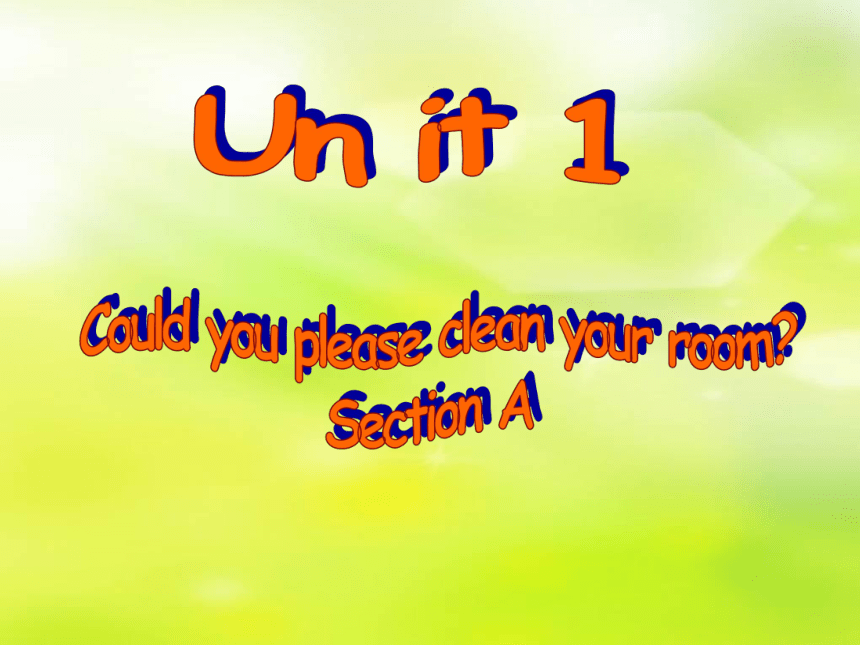
|
|
| 格式 | zip | ||
| 文件大小 | 1021.6KB | ||
| 资源类型 | 教案 | ||
| 版本资源 | 鲁教版 | ||
| 科目 | 英语 | ||
| 更新时间 | 2017-12-03 00:00:00 | ||
图片预览

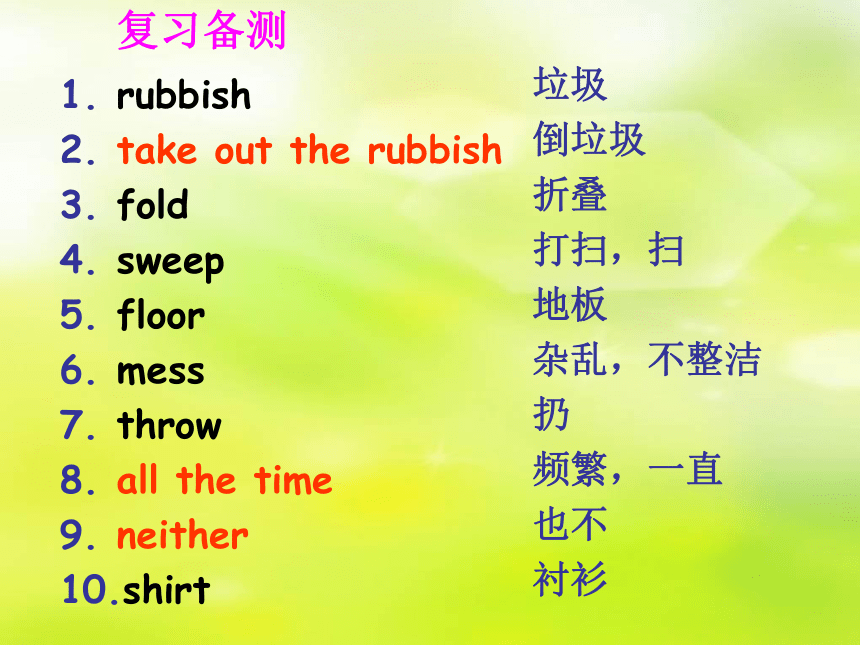
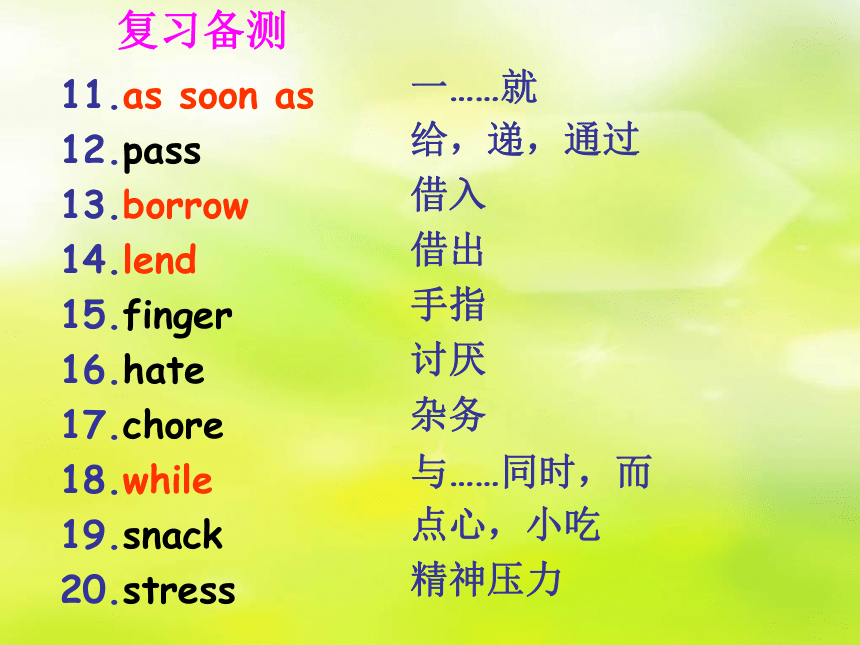
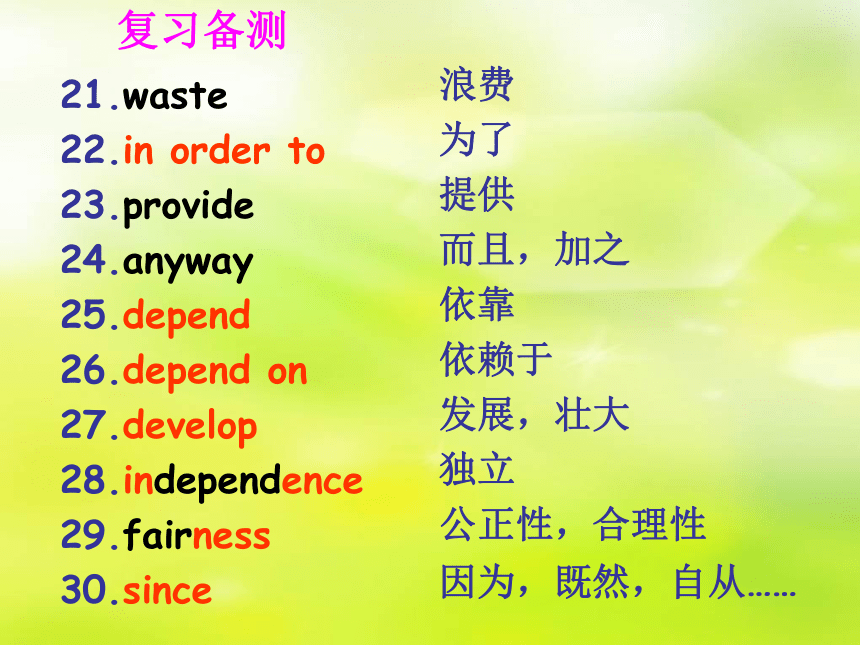
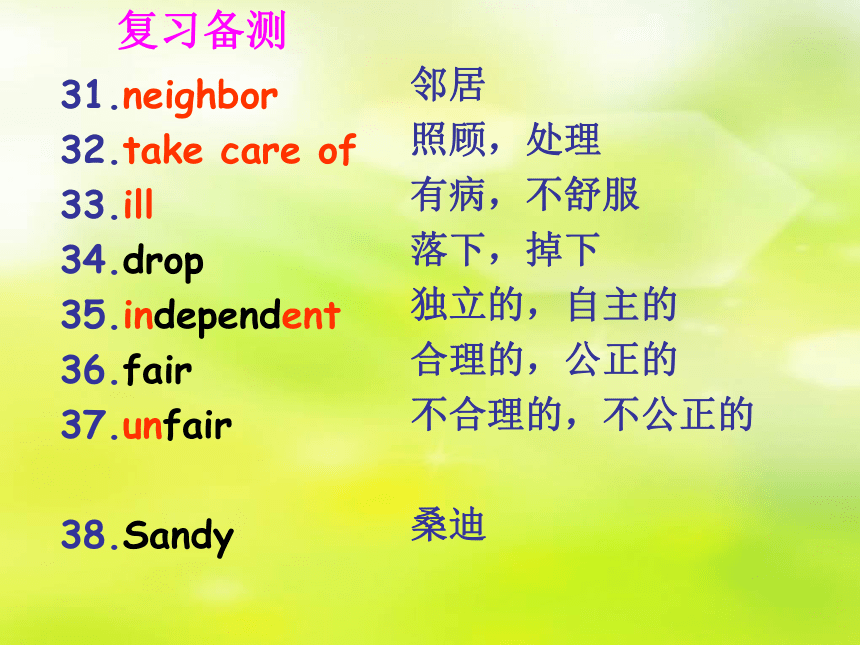
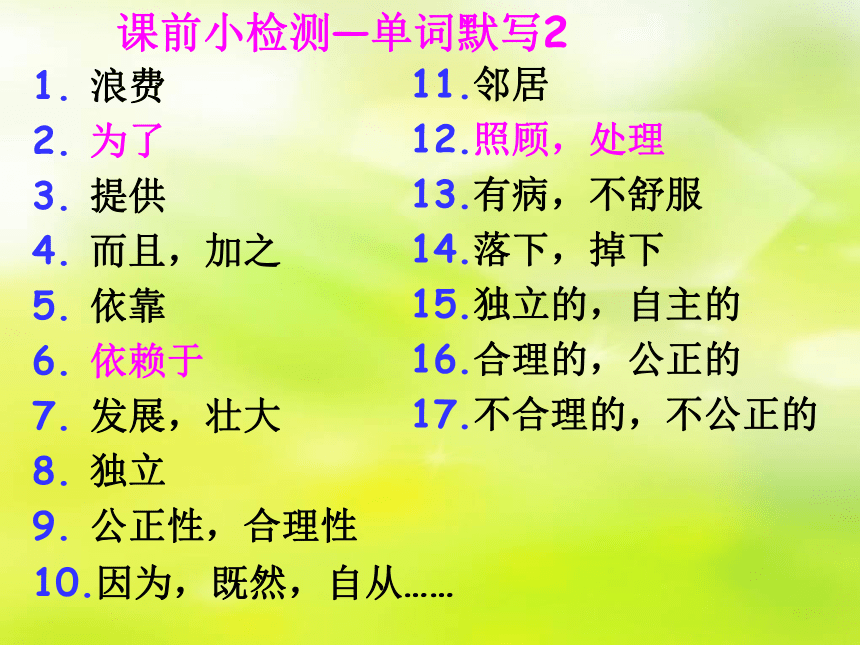
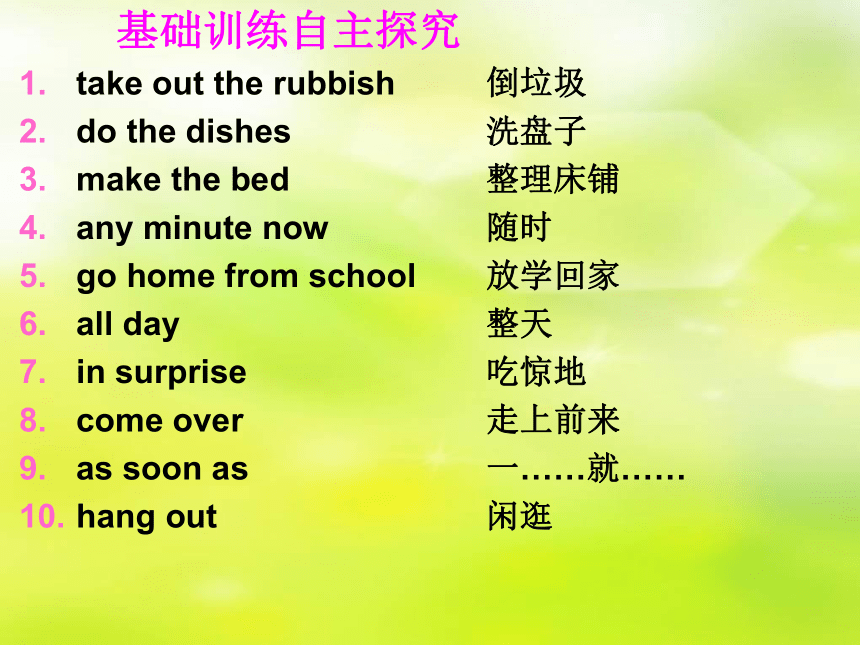
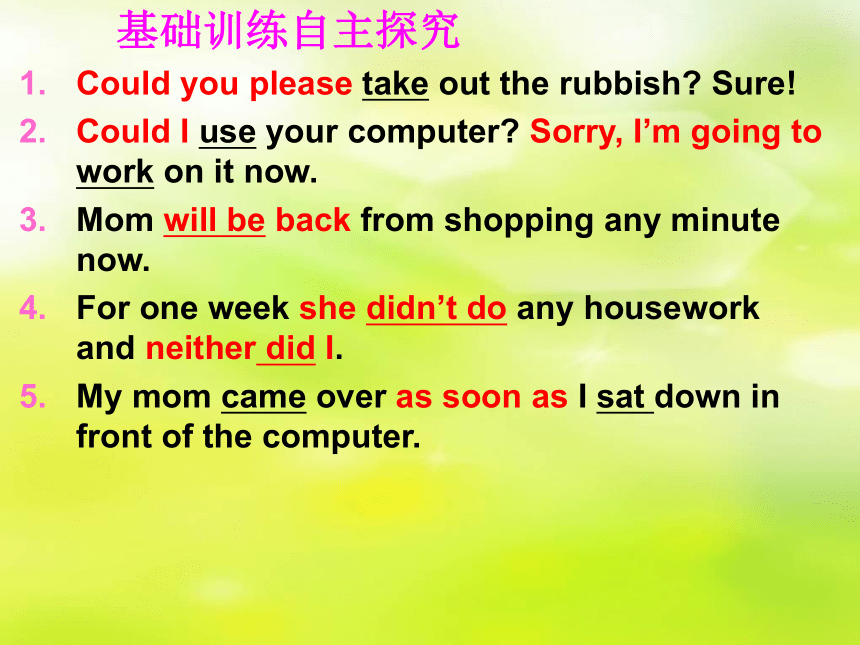

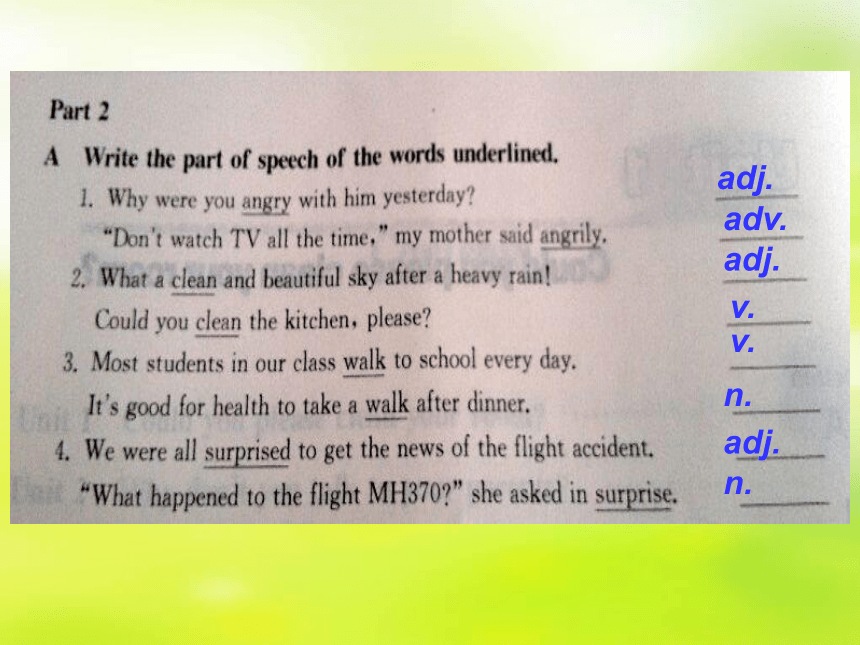
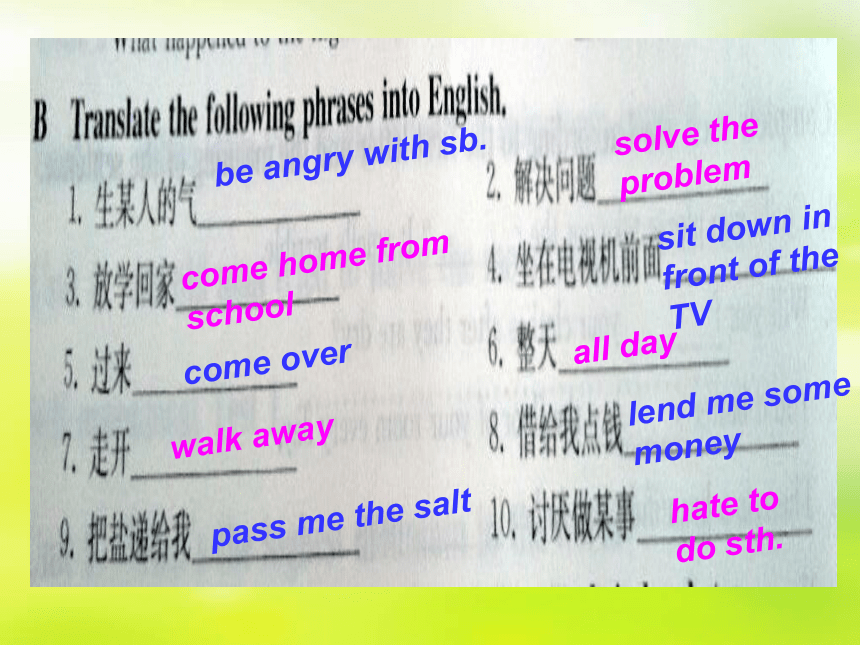
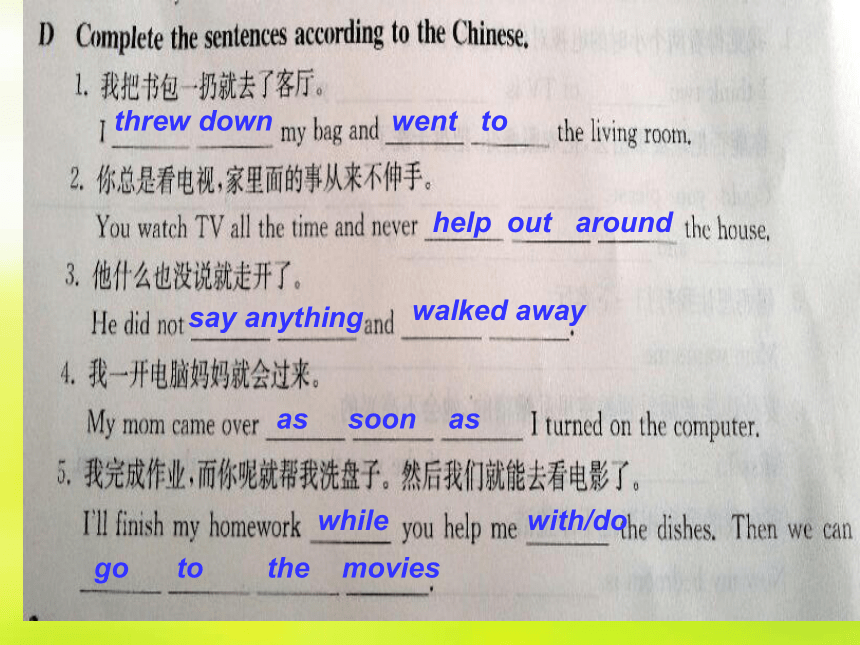
文档简介
课件45张PPT。 Could you please clean your room?
Section A Un it 1 rubbish
take out the rubbish
fold
sweep
floor
mess
throw
all the time
neither
shirt
复习备测垃圾
倒垃圾
折叠
打扫,扫
地板
杂乱,不整洁
扔
频繁,一直
也不
衬衫
as soon as
pass
borrow
lend
finger
hate
chore
while
snack
stress
一……就
给,递,通过
借入
借出
手指
讨厌
杂务
与……同时,而
点心,小吃
精神压力
复习备测waste
in order to
provide
anyway
depend
depend on
develop
independence
fairness
since
浪费
为了
提供
而且,加之
依靠
依赖于
发展,壮大
独立
公正性,合理性
因为,既然,自从……
复习备测neighbor
take care of
ill
drop
independent
fair
unfair
Sandy
邻居
照顾,处理
有病,不舒服
落下,掉下
独立的,自主的
合理的,公正的
不合理的,不公正的
桑迪
复习备测课前小检测—单词默写2浪费
为了
提供
而且,加之
依靠
依赖于
发展,壮大
独立
公正性,合理性
因为,既然,自从……
邻居
照顾,处理
有病,不舒服
落下,掉下
独立的,自主的
合理的,公正的
不合理的,不公正的
take out the rubbish
do the dishes
make the bed
any minute now
go home from school
all day
in surprise
come over
as soon as
hang out
基础训练自主探究倒垃圾
洗盘子
整理床铺
随时
放学回家
整天
吃惊地
走上前来
一……就……
闲逛
Could you please take out the rubbish? Sure!
Could I use your computer? Sorry, I’m going to work on it now.
Mom will be back from shopping any minute now.
For one week she didn’t do any housework and neither did I.
My mom came over as soon as I sat down in front of the computer.
基础训练自主探究请你把垃圾倒掉好吗?行啊!
我能否用一下你的电脑?对不起,我马上就用。
妈妈随时会购物归来。
一周的时间,她没有做任何家务,我也没有。
我一坐在电脑前,妈妈就过来了。
背诵adj.adv.adj.v.v.n.adj.n.be angry with sb.solve the problemcome home from schoolsit down in front of the TVcome overall daywalk awaylend me some moneypass me the salthate to do sth.threw downwent tohelp out aroundsay anythingwalked awayas soon aswhilewith/dogo to the movieswelcomedthrewwas workingreplyingto cleanto sharecommunicationeldergoingto helpD
B
A
E
C
拓展运用sofa
kitchen
white
asked
sad
hair
girl
good
watching
grandma’s
A
D
B
D
angry(副词)
solve=
come(过去式)
疲惫的
throw(过去式)
sit(过去式)
reply(同义词)
neither(反义词)
finally=
or/and区别
surprise(形容词)
comfortable(反义词)
也
3a重点单词angrily
work out
came
tired
threw
sat
answer
both
at last
否定句/肯定句
surprised/surprising
uncomfortable
too /either /also
be/get angry with
last month
come home from school
throw down
sit down
in front of
come over
take the dog for a walk
all the time
all day
3a短语突破生……的气
上个月
放学回家来
扔下
坐下
在……的前面
过来
遛狗
一直
整天
do housework
as…as 中间加形副词原级
shout back
walk away
the next day
in surprise
need to do sth.
share the housework
neither of us
as soon as
neither…nor…(就近一致)
3a短语突破做家务
和……一样……
顶嘴
走开
第二天
惊奇地
需要做某事
分担家务
我们俩都不
一……就……
既不……也不……
Neither my parents nor my sister likes watching the show.Can you write as carefully as he? 上个月, our dog welcomed me when I 放学回家来. He wanted a walk, but I was too 累的. I 扔下 my bag and went to the living room. The minute I 坐到前面 the TV, my mom 过来. “ Could you please 遛狗?” she asked.
Have a try! “Could I watch one show first?” I asked.
“No!” she 生气地回答. ”You watch TV 一直 and never help out around the house! I can’t work 整天 and 做家务 all evening.”
“Well, I work all day at school, too! I’m just 和你一样累 are!” I 顶嘴.
Have a try! My mom did not say anything and walked a way. For one week, she did not do any housework and 也不 did I. 最终, I could not find a clean dish 和 a clean shirt.
第二天, my mom came home from work to find the house clean and tidy.
Have a try! ”What happened?” she asked 惊奇地.
“I’m so sorry, Mom. I finally understand that we 需要分担家务 to have a clean and 舒适的 home,” I replied.
Have a try!1. You watch TV all the time and ...
all the time(在该段时间内)一直;向来, 一向;时时刻刻;每时每刻
e.g. I do this all the time.
我一直是这么做的。
This happens all the time.
这种情况是时时发生的。Language points2. I’m just as tired as you are!
as ... as 意为 “和……一样” ,表示同级的比较。使用时要注意第一个as为副词,第二个as为连词。其基本结构为:as +?adj./?adv.?+ as。
e.g. This?film?is?as?interesting?as?that?one.
这部电影和那部电影一样有趣。
Your?pen?writes?as?smoothly?as?mine.
你的钢笔书写起来和我的一样流畅。as … as 的否定形式为 “not as/so + adj./adv. + as”。
e.g. He didn’t act as well as you.
他表现得不如你好。3. For one week, she did not do any housework and neither did I.
neither 用作副词,作“也不”解释,放在句首,表示前面否定的内容也适用于另一个人或物,句子须采用部分倒装。此时也可用nor替换 neither 使用。例如:
— I?don’t?like?this?dress.?
我不喜欢这件连衣裙。
— Neither?/?Nor?do?I.?我也不喜欢。
注意:neither 之后的主语要置于助动词或系动词之后。neither 用作代词,表示“两者都不,双方均不”。例如:
He?answered?neither?of?the?letters.?
他两封信都没回。
— Which?one?would?you?like??
你喜欢哪一个?
— Neither.?
两个都不喜欢。?1. also 是比较正式的用语,语气较庄重。它通常放在句中,位于行为动词之前,连系动词之后; 如有助动词或情态动词,一般放在助动词或情态动词之后。例如:
Peter also has two brothers.
彼得也有两个兄弟。 also, too, either, neither 的用法I am also a student. 我也是一名学生。
Mrs. Green can also sing the song in Chinese. 格林夫人也能用汉语唱这首歌。 2. too 是普通用词,多用于口语,语气较随便。一般用在肯定句中,放在句末。例如:
I’m in Row 1, too.
我也在第一排。
注意:also和too一般都用于肯定句,很
少用于否定句。 3. either 表示“也”时,一般只用于否定
句,且置于句末。例如:
I don’t know him. Tom doesn’t know
him, either.
我不认识他,汤姆也不认识他。
If you don’t go there, he won’t go
there, either.
如果你不去那儿,他也不会去那儿。
注意:either 本身没有否定的意义。所以多与 not 连用。 4. neither 表示“两个都不”,它作主语
时,谓语动词常用单数。例如:
Neither of you can do it.
你们两个都不能做这件事。 We Love our parents. We help do the
chores. Key sentence structures Could you(please)+ V-原形?
表示委婉地提出请求1. Could you please clean your room?
Yes, sure./ Of course./ Certainly./All
right.
2. Could you please do the dishes?
Sorry, I can’t. I have to do my
homework.a. Yes, here you are.
b. Hmm. How much do you need?
c. Yes, sure. No problem. I finished reading it last night.
d. Yes, but don’t come back too late.
e. No, I can’t. I cut my finger and I’m trying not to get it wet.4a Write R for requests and P for
permission. Then match each
one with the correct response. 1. ___ Could I hang out with my friends
after the movies? 出去玩
2. ___ Could you please pass me the salt?
3. ___ Could I borrow that book?
4. ___ Could you help me do the dishes?
5. ___ Could you lend me some money?PPRRRdacebborrow和lend
borrow和lend都有“借”的意思,但它们的含义和用法有所不同。
★ borrow表示“借入”,即把本来不属于自己的东西借来暂时使用,常与介词from连用。如:
You can borrow a book from the library.?
★ lend表示“借出”,即把属于自己的东西借给别人暂时使用,常与介词to连用,也可以跟双宾语。如:
He’s going to lend his bike to Tom.
You mustn’t lend others my pen.? 4b Fill in the blanks in the conversation. A: I hate to ____ chores.
B: Well, I hate some chores too, but I like
other chores.
A: Really? Great! _____ I ask you to ____ me
with some chores then?
B: What do you need help with?
A: ______ you please _____ my clothes for me?
B: I don’t want to do that! It’s boring!Could foldhelpdoCould A: OK. Then ______ you ______ do the
dishes for me?
B: Sure, no problem. But _____ we go to
the movies after that?
A: Sure. I’ll finish my homework while you
help me with the dishes. Then we can go
to the movies. pleasecould could hate用作动词,与like意义相反,意为“憎恨,厌恶,不喜欢”,其后可接名词、代词、动词的-ing形式以及动词不定式等。
e.g. Lily hates mice / them.
Jim hated exercising when he was
young.
I hate to do the laundry now.If we are having a camping trip, what should we do before the trip?DiscussionWhat should we do before the trip?buy some drinksbuy some foodtake a big cloth bring a tenttake an umbrellatake a rubbish bag bring a cameraprepare some programs单项选择。
1. -- Could you please take care of my dog?
-- ______. I’m too busy.
A. Yes, you can
B. Sure
C. Sorry, I can’tC2. -- Could you please ____ his bed?
-- Certainly!
A. makes B. making C. make
3. -- Could I use your car?
-- ______.
A. Sure, you can
B. Sorry, you can
C. Sure, I canCA
Section A Un it 1 rubbish
take out the rubbish
fold
sweep
floor
mess
throw
all the time
neither
shirt
复习备测垃圾
倒垃圾
折叠
打扫,扫
地板
杂乱,不整洁
扔
频繁,一直
也不
衬衫
as soon as
pass
borrow
lend
finger
hate
chore
while
snack
stress
一……就
给,递,通过
借入
借出
手指
讨厌
杂务
与……同时,而
点心,小吃
精神压力
复习备测waste
in order to
provide
anyway
depend
depend on
develop
independence
fairness
since
浪费
为了
提供
而且,加之
依靠
依赖于
发展,壮大
独立
公正性,合理性
因为,既然,自从……
复习备测neighbor
take care of
ill
drop
independent
fair
unfair
Sandy
邻居
照顾,处理
有病,不舒服
落下,掉下
独立的,自主的
合理的,公正的
不合理的,不公正的
桑迪
复习备测课前小检测—单词默写2浪费
为了
提供
而且,加之
依靠
依赖于
发展,壮大
独立
公正性,合理性
因为,既然,自从……
邻居
照顾,处理
有病,不舒服
落下,掉下
独立的,自主的
合理的,公正的
不合理的,不公正的
take out the rubbish
do the dishes
make the bed
any minute now
go home from school
all day
in surprise
come over
as soon as
hang out
基础训练自主探究倒垃圾
洗盘子
整理床铺
随时
放学回家
整天
吃惊地
走上前来
一……就……
闲逛
Could you please take out the rubbish? Sure!
Could I use your computer? Sorry, I’m going to work on it now.
Mom will be back from shopping any minute now.
For one week she didn’t do any housework and neither did I.
My mom came over as soon as I sat down in front of the computer.
基础训练自主探究请你把垃圾倒掉好吗?行啊!
我能否用一下你的电脑?对不起,我马上就用。
妈妈随时会购物归来。
一周的时间,她没有做任何家务,我也没有。
我一坐在电脑前,妈妈就过来了。
背诵adj.adv.adj.v.v.n.adj.n.be angry with sb.solve the problemcome home from schoolsit down in front of the TVcome overall daywalk awaylend me some moneypass me the salthate to do sth.threw downwent tohelp out aroundsay anythingwalked awayas soon aswhilewith/dogo to the movieswelcomedthrewwas workingreplyingto cleanto sharecommunicationeldergoingto helpD
B
A
E
C
拓展运用sofa
kitchen
white
asked
sad
hair
girl
good
watching
grandma’s
A
D
B
D
angry(副词)
solve=
come(过去式)
疲惫的
throw(过去式)
sit(过去式)
reply(同义词)
neither(反义词)
finally=
or/and区别
surprise(形容词)
comfortable(反义词)
也
3a重点单词angrily
work out
came
tired
threw
sat
answer
both
at last
否定句/肯定句
surprised/surprising
uncomfortable
too /either /also
be/get angry with
last month
come home from school
throw down
sit down
in front of
come over
take the dog for a walk
all the time
all day
3a短语突破生……的气
上个月
放学回家来
扔下
坐下
在……的前面
过来
遛狗
一直
整天
do housework
as…as 中间加形副词原级
shout back
walk away
the next day
in surprise
need to do sth.
share the housework
neither of us
as soon as
neither…nor…(就近一致)
3a短语突破做家务
和……一样……
顶嘴
走开
第二天
惊奇地
需要做某事
分担家务
我们俩都不
一……就……
既不……也不……
Neither my parents nor my sister likes watching the show.Can you write as carefully as he? 上个月, our dog welcomed me when I 放学回家来. He wanted a walk, but I was too 累的. I 扔下 my bag and went to the living room. The minute I 坐到前面 the TV, my mom 过来. “ Could you please 遛狗?” she asked.
Have a try! “Could I watch one show first?” I asked.
“No!” she 生气地回答. ”You watch TV 一直 and never help out around the house! I can’t work 整天 and 做家务 all evening.”
“Well, I work all day at school, too! I’m just 和你一样累 are!” I 顶嘴.
Have a try! My mom did not say anything and walked a way. For one week, she did not do any housework and 也不 did I. 最终, I could not find a clean dish 和 a clean shirt.
第二天, my mom came home from work to find the house clean and tidy.
Have a try! ”What happened?” she asked 惊奇地.
“I’m so sorry, Mom. I finally understand that we 需要分担家务 to have a clean and 舒适的 home,” I replied.
Have a try!1. You watch TV all the time and ...
all the time(在该段时间内)一直;向来, 一向;时时刻刻;每时每刻
e.g. I do this all the time.
我一直是这么做的。
This happens all the time.
这种情况是时时发生的。Language points2. I’m just as tired as you are!
as ... as 意为 “和……一样” ,表示同级的比较。使用时要注意第一个as为副词,第二个as为连词。其基本结构为:as +?adj./?adv.?+ as。
e.g. This?film?is?as?interesting?as?that?one.
这部电影和那部电影一样有趣。
Your?pen?writes?as?smoothly?as?mine.
你的钢笔书写起来和我的一样流畅。as … as 的否定形式为 “not as/so + adj./adv. + as”。
e.g. He didn’t act as well as you.
他表现得不如你好。3. For one week, she did not do any housework and neither did I.
neither 用作副词,作“也不”解释,放在句首,表示前面否定的内容也适用于另一个人或物,句子须采用部分倒装。此时也可用nor替换 neither 使用。例如:
— I?don’t?like?this?dress.?
我不喜欢这件连衣裙。
— Neither?/?Nor?do?I.?我也不喜欢。
注意:neither 之后的主语要置于助动词或系动词之后。neither 用作代词,表示“两者都不,双方均不”。例如:
He?answered?neither?of?the?letters.?
他两封信都没回。
— Which?one?would?you?like??
你喜欢哪一个?
— Neither.?
两个都不喜欢。?1. also 是比较正式的用语,语气较庄重。它通常放在句中,位于行为动词之前,连系动词之后; 如有助动词或情态动词,一般放在助动词或情态动词之后。例如:
Peter also has two brothers.
彼得也有两个兄弟。 also, too, either, neither 的用法I am also a student. 我也是一名学生。
Mrs. Green can also sing the song in Chinese. 格林夫人也能用汉语唱这首歌。 2. too 是普通用词,多用于口语,语气较随便。一般用在肯定句中,放在句末。例如:
I’m in Row 1, too.
我也在第一排。
注意:also和too一般都用于肯定句,很
少用于否定句。 3. either 表示“也”时,一般只用于否定
句,且置于句末。例如:
I don’t know him. Tom doesn’t know
him, either.
我不认识他,汤姆也不认识他。
If you don’t go there, he won’t go
there, either.
如果你不去那儿,他也不会去那儿。
注意:either 本身没有否定的意义。所以多与 not 连用。 4. neither 表示“两个都不”,它作主语
时,谓语动词常用单数。例如:
Neither of you can do it.
你们两个都不能做这件事。 We Love our parents. We help do the
chores. Key sentence structures Could you(please)+ V-原形?
表示委婉地提出请求1. Could you please clean your room?
Yes, sure./ Of course./ Certainly./All
right.
2. Could you please do the dishes?
Sorry, I can’t. I have to do my
homework.a. Yes, here you are.
b. Hmm. How much do you need?
c. Yes, sure. No problem. I finished reading it last night.
d. Yes, but don’t come back too late.
e. No, I can’t. I cut my finger and I’m trying not to get it wet.4a Write R for requests and P for
permission. Then match each
one with the correct response. 1. ___ Could I hang out with my friends
after the movies? 出去玩
2. ___ Could you please pass me the salt?
3. ___ Could I borrow that book?
4. ___ Could you help me do the dishes?
5. ___ Could you lend me some money?PPRRRdacebborrow和lend
borrow和lend都有“借”的意思,但它们的含义和用法有所不同。
★ borrow表示“借入”,即把本来不属于自己的东西借来暂时使用,常与介词from连用。如:
You can borrow a book from the library.?
★ lend表示“借出”,即把属于自己的东西借给别人暂时使用,常与介词to连用,也可以跟双宾语。如:
He’s going to lend his bike to Tom.
You mustn’t lend others my pen.? 4b Fill in the blanks in the conversation. A: I hate to ____ chores.
B: Well, I hate some chores too, but I like
other chores.
A: Really? Great! _____ I ask you to ____ me
with some chores then?
B: What do you need help with?
A: ______ you please _____ my clothes for me?
B: I don’t want to do that! It’s boring!Could foldhelpdoCould A: OK. Then ______ you ______ do the
dishes for me?
B: Sure, no problem. But _____ we go to
the movies after that?
A: Sure. I’ll finish my homework while you
help me with the dishes. Then we can go
to the movies. pleasecould could hate用作动词,与like意义相反,意为“憎恨,厌恶,不喜欢”,其后可接名词、代词、动词的-ing形式以及动词不定式等。
e.g. Lily hates mice / them.
Jim hated exercising when he was
young.
I hate to do the laundry now.If we are having a camping trip, what should we do before the trip?DiscussionWhat should we do before the trip?buy some drinksbuy some foodtake a big cloth bring a tenttake an umbrellatake a rubbish bag bring a cameraprepare some programs单项选择。
1. -- Could you please take care of my dog?
-- ______. I’m too busy.
A. Yes, you can
B. Sure
C. Sorry, I can’tC2. -- Could you please ____ his bed?
-- Certainly!
A. makes B. making C. make
3. -- Could I use your car?
-- ______.
A. Sure, you can
B. Sorry, you can
C. Sure, I canCA
同课章节目录
- Unit 1 Could you please clean your room?
- Section A
- Section B
- Unit 2 Why don't you talk to your parents?
- Section A
- Section B
- Unit 3 What were you doing when the rainstorm came
- Section A
- Section B
- Unit 4 An old man tried to move the mountains.
- Section A
- Section B
- Unit 5 What's the highest mountain in the world?
- Section A
- Section B
- Unit 6 Have you read Treasure Island yet?
- Section A
- Section B
- Unit 7 Have you ever been to a museum?
- Section A
- Section B
- Unit 8 I've had this bike for three years.
- Section A
- Section B
